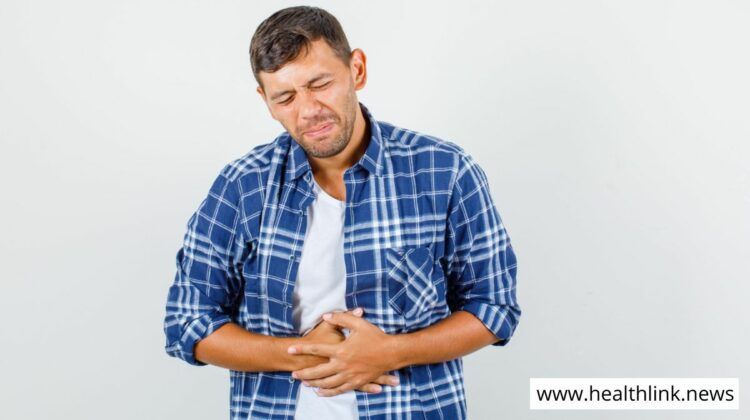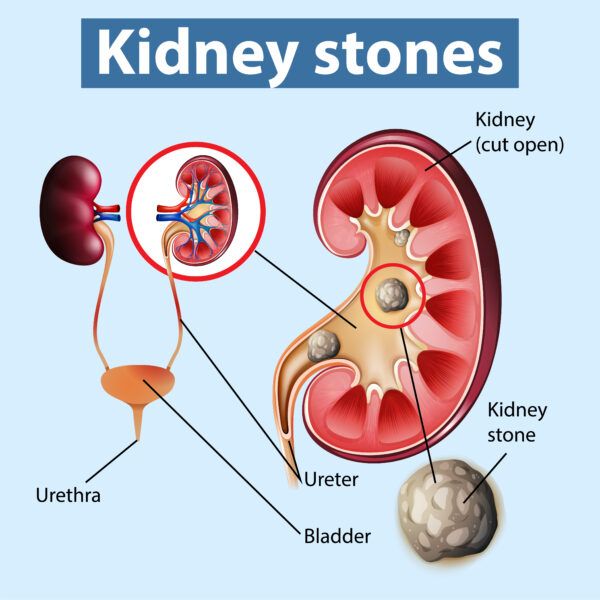Kidney Stone: Causes, Risk and Prevention

Kidney Stones can be a big problem for many people if left untreated. Kidney stones are no fun. They can be painful and even cause nausea or vomiting. But it is true that regular kidney stone treatment is possible and through diet, exercise, medications, and more that your odds of getting one are reduced. You might need surgery to get rid of them or to keep them from coming back. What causes kidney stones? Kidney stones form when certain minerals and salts, including calcium, urate, and oxalate, build up in your kidneys. But with the right foods, plenty of water, and proper medication, you can lower your chances of getting them.
What Is Kidney Stone?
As your kidneys filter blood, they pass waste products, such as excess potassium and uric acid, through tubes into the urine. Kidney stones are solid masses or crystals that can form in your kidney or ureter — tubes that carry urine from the kidneys to the bladder. A stone in your kidney is an irregularly-shaped solid mass that can be as small as a grain of sand up to the size of a golf ball. Depending on its size, it may not progress beyond the cyst stage but it can cause pain when it exits through your urinary tract by blocking one of these tubes. When you have a kidney stone, it is often very painful. All patients experience some symptoms as they pass through the urinary tract into the bladder, which may include pain in your side and back or severe pain that makes urinating difficult or impossible.

Kidney stones are common and can develop in either one or both kidneys. Kidney stones can cause problems in many ways. Most stones are small and pass out of your body on their own. If a large stone cannot pass, it can get trapped in your ureter (the tube that drains urine from your kidney down to your bladder). When this happens, the stone can cause bleeding and keep urine from leaving your body. You may need surgery for a stone that cannot pass on its own.
How Common Are Kidney Stone?
Kidney stones are quite common in adults, but other symptoms and causes may mean that you should contact your doctor. There is no real risk of kidney stones in children with asthma. It is difficult to figure out who will get a kidney stone and why, but researchers believe they may have more risk factors than adults. However, it is important for you and your child to receive annual checks from your doctor because these checks will help to diagnose kidney stones early on. Kidney stones that form in the kidneys can be painful and cause other health issues. Kidney stones do not have to be a death sentence. If you get treated quickly, there are many strategies to stop them from growing.
Risks Factor For Kidney Stone
Kidney stones can be painful, scary, and frightening. So it is no surprise you want to know everything there is to know about them. For starters, let us talk about what kidney stones are and when you might need to see a doctor about them. Kidney stones are small, solid crystals that form in your kidney. They can have different causes and appear for different reasons. Some are related to kidney infections, whereas others may be related to your genes or the presence of certain minerals in your system. Forty percent of the people who get kidney stones have relatives who also get them. Various risk factors involved in this case are:
- Obesity: Obesity and diabetes are both caused by excess weight. You may have or have had them before, but when you are overweight, they tend to get worse and show up more frequently. The same is true if you have diabetes.
- Gout: Gout is a type of arthritis that attacks your joints. It happens when uric acid builds up in your blood and makes crystals, or monosodium urate, form in your joints or kidney. These crystal-filled joints can cause pain and swelling.
- Intestinal surgery: Gastric bypass surgery (also known as stomach banding) and some types of intestinal surgery can cause your risk to go up.
- Hyperthyroidism: Hyperthyroidism, or overactive thyroid, is a condition in which your thyroid gland produces too much thyroid hormone. This can cause your body to have too much calcium in your blood, which can cause kidney stones and other problems because of this extra calcium.
- Certain kidney diseases: There are many kinds of kidney diseases and disorders, some of which can become quite serious. Some examples include polycystic kidney disease, medullary sponge kidney, and one disease caused by high blood pressure called hypertensive nephrosclerosis.
Note: Middle-aged men are most likely to get kidney stones, though it can happen to people of any age or sex. If a stone causes pain and swelling in the kidney, you need medical help as soon as possible.
Causes For Kidney Stone
You may want to consider keeping an eye on your diet if you have a kidney stone. Even if you are in good health, your diet can play a big role. If you have good kidney health and high blood pressure, do not assume that is all there is to it. If you have any of these risk factors, your diet could encourage kidney stones to grow. One top reason: You may not drink enough water. That means you will make too little pee, which gives the stones more chances to form. Some other causes which can be noted are:
- Colas: Colas contain a high percentage of sugar, making them a common cause of kidney stones. Colas contain high amounts of fructose and phosphates, which may lead to kidney stones. Stop drinking Cola’s and other sugary beverages and enjoy our diet drinks instead!
- Oxalates: Oxalates are organic compounds found in a number of foods, including healthy ones such as spinach, sweet potatoes, and rhubarb. But oxalates also bind easily to certain minerals, including calcium. And when oxalate levels in the blood rise too high, it can promote the formation of kidney stones.
- Salt (especially sodium): Diets high in sodium, which you get through salt, can increase your risk for kidney stones. Eating foods rich in calcium can help lower the risk. You should not cut back on your salt intake if you eat a calcium-rich diet.
- Vitamin C supplements: If you are taking a high-dose vitamin C supplement, or eating lots of vitamin C-rich foods (citrus fruits and juices), you may be doubling your risk of getting a kidney stone. You can still get enough vitamin C from food.
- Animal protein: Animal protein is one of the reasons for kidney stones. Reduce your consumption of animal protein as much as possible.
- Medications: Medications can make kidney stones more likely to form and more likely to cause more difficulties with urination. Some medications can contribute to kidney stones by increasing the amount of calcium and other minerals in your urine, decreasing your urine volume, or causing kidney damage.
- Previous kidney stones: Not only are kidney stones painful, but they can also stop you in your tracks. If you have had them once, you are likely to get them again.
Ways To Prevent Kidney Stone
There are various ways by which kidney stones can be prevented be it naturally or through medication. Some of the ways are:
- Stay hydrated: Drinking enough water is important for preventing kidney stones. If you do not drink enough, your urine output will be low. Low urine output means your urine is more concentrated and less likely to dissolve urine salts (such as oxalate) that cause stones. You can tell whether you are hydrated by looking at the color of your urine — it should be clear or pale yellow. If it is dark, you need to drink more.
- More calcium-rich food: The most common type of kidney stone is calcium oxalate, and you should keep in mind that the opposite is true. A low-calcium diet may increase your risk of kidney stones and osteoporosis. Calcium supplements may also increase your risk of stones. Taking a calcium supplement with a meal can help reduce this risk. Calcium-rich foods include Low-fat milk, low-fat cheese, and low-fat yogurt.
- Eat less sodium: If you eat a high-salt diet, your body may not absorb enough calcium to keep up with the demand of your growing bones. You may develop kidney stones that eventually need to be removed. Eating less salt can help lower your risk of developing kidney stones.
- Eat a few oxalate-rich foods: Oxalate is a natural compound found in foods that bind with calcium in the urine to form kidney stones. Limiting oxalate-rich foods may help prevent stones from forming. Foods high in oxalates are spinach, chocolate, sweet potatoes, wheat bran, coffee, beets, peanuts, rhubarb, and soy products.
- Eat less animal protein: Animal protein meats are high in sodium and may increase urine acid. High urine acid may cause calcium oxalate kidney stones. You should try to limit or avoid: beef, poultry, fish, and pork.
- Avoid vitamin C supplements: Men who take high doses of vitamin C supplements may double their risk of forming a kidney stone, according to a 2013 study. Researchers do not believe that vitamin C from food carries the same risk, but this is something to keep in mind if you are a man taking high-dose vitamin C supplements.
- Explore herbal remedies: Chanca Piedra has been used for centuries as a folk remedy to prevent the formation of kidney stones. It is thought to reduce the size of existing stones and help prevent calcium-oxalate stones from forming in the kidneys. However, herbal remedies are not well-regulated or well-researched for these uses.
- Talk to your doctor about the medication you are currently taking: Certain prescriptions or over-the-counter medications can result in kidney stones. If you are taking any of these medications such as decongestants, Diuretics, protease inhibitors, anticonvulsants, steroids, chemotherapy drugs, or uricosuric drugs, talk to your doctor about other medication options. You should not stop taking any prescribed medications without your doctor’s approval.
- Talk to your doctor about preventive measures: If you receive a medication to reduce kidney stones, it usually is only prescribed for short periods of time. Because the stones can be reoccurring, different medications may be required for each type. The type of stones you get and your risk of recurrence will determine which medication is recommended at a particular time.
